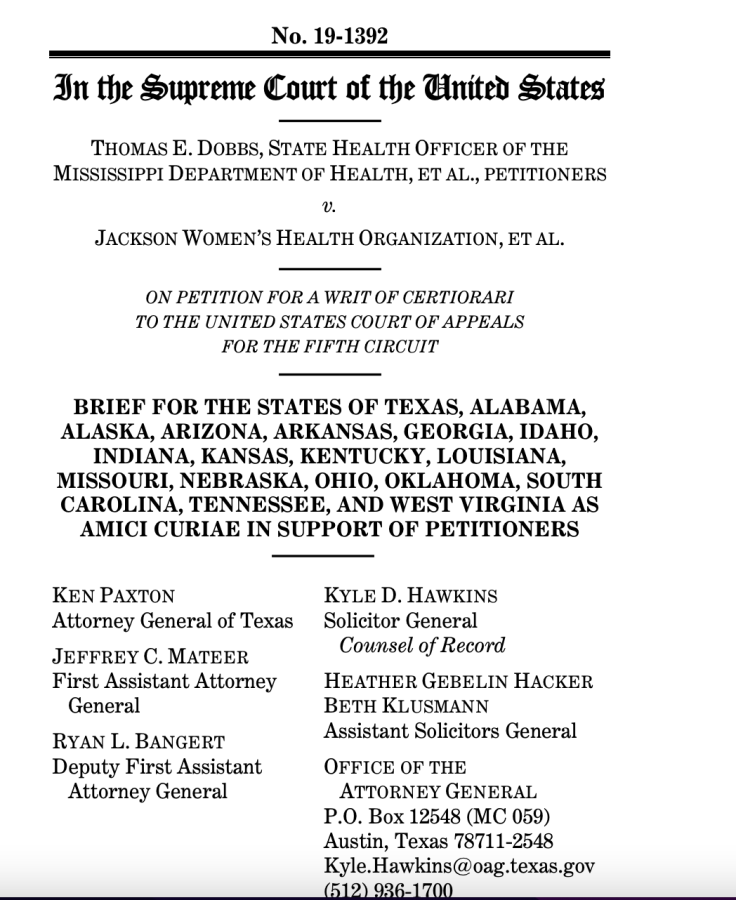Women’s Rights May Be Infringed as Roe v. Wade is Reconsidered
Many amici curiae have filed briefs in support of the petitioners or respondents to Dobbs v. Jackson. The Supreme Court is addressing the question of whether previability restrictions on abortion are unconstitutional.
January 6, 2022
Roe v. Wade, a nearly half a century year-old law protecting women’s right to choose, is being reconsidered by the Supreme Court.
Brief Background
Roe v. Wade was a decision made by the U.S. Supreme Court regarding a woman’s freedom to make the choice of terminating her pregnancy without extreme restrictions from the government. In 1969 a woman who went by the fictitious name Jane Roe, sought to have an abortion. However, she lived in Texas where receiving an abortion was illegal. A lawsuit was filed against the local district attorney, Henry Wade. The Court ruled in her favor. In 1973, it was issued by the Supreme Court that a woman’s right to privacy, found in the penumbras of the Fourteenth Amendment of the United States Constitution, includes her right to get an abortion, and the government may not infringe on this right without compelling state interest.
Current Issues at Hand
A 2018 Mississippi law that bans abortions after 15 weeks of pregnancy, is being considered at the Supreme Court in the case Dobbs v. Jackson Women’s Health Organization. This will potentially challenge the precedent of Roe v. Wade. If the Supreme Court overturns Roe, abortion access will be regulated by individual states rather than the federal government.
Some of the current Supreme Court justices have clearly stated their stance against Roe v. Wade. Justice Clarence Thomas stated in June Medical Services v. Russo, “Roe is grievously wrong for many reasons, but the most fundamental is that its core holding — that the Constitution protects a woman’s right to abort her unborn child — finds no support in the text of the Fourteenth Amendment.” Justice Samuel A. Alito Jr. stated, “The Constitution does not protect a right to abortion.”
Former president, Donald Trump vowed to add justices to the Supreme Court who he felt would overturn Roe v. Wade. With this in mind, he appointed Associate Justice Brett Kavanaugh to the Supreme Court as well as Justices Amy Coney Barrett and Neil Gorsuch. The relationships the Court Justices have made outside the court, places them in a politically-motivated perspective, rather than motivated in the name of justice. Knowing that the Supreme Court has a conservative majority, this does not seem promising for the future of abortion access in the United States.
A Future Without Roe v. Wade
In the event that Roe v. Wade is overturned, it will have a drastic effect on abortion laws nationally. The pre-viability restrictions passed in Texas and now Mississippi, have the power to influence other conservative-leaning states to make adjustments or even institute new laws prohibiting abortions.
Social division in our country also will affect the access women have to abortions. People who have the means to leave the state in which they live, will continue to have the advantage of getting an abortion if needed or wanted. However, people who are not in good financial standing will no longer have this opportunity. Not only will this be a detriment to their financial situation due to childcare costs, but now children may not receive proper care.
A decision has not yet been handed down. People of different political standings are waiting to hear what their future holds.


